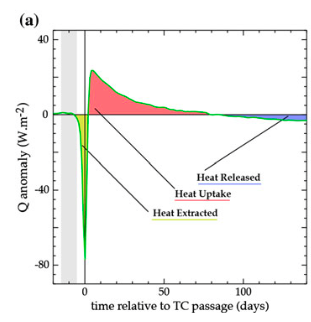Influence of Tropical Cyclones on sea surface temperature seasonal cycle and ocean heat transport
Abstract
Recent studies suggested that tropical cyclones (TCs) contribute significantly to the meridional oceanic heat transport by injecting heat into the subsurface through mixing. Here, we estimate the long-term oceanic impact of TCs by inserting realistic wind vortices along observed TCs tracks in a 1/2° resolution ocean general circulation model over the 1978–2007 period. Warming of TCs’ cold wakes results in a positive heat flux into the ocean (oceanic heat uptake; OHU) of ~480 TW, consistent with most recent estimates. However, ~2/5 of this OHU only compensates the heat extraction by the TCs winds during their passage. Another ~2/5 of this OHU is injected in the seasonal thermocline and hence released back to the atmosphere during the following winter. Because of zonal compensations and equatorward transport, only one-tenth of the OHU is actually exported poleward (46 TW), resulting in a marginal maximum contribution of TCs to the poleward ocean heat transport. Other usually neglected TC-related processes however impact the ocean mean state. The residual Ekman pumping associated with TCs results in a sea-level drop (rise) in the core (northern and southern flanks) of TC-basins that expand westward into the whole basin as a result of planetary wave propagation. More importantly, TC-induced mixing and air-sea fluxes cool the surface in TC-basins during summer, while the re-emergence of subsurface warm anomalies warms it during winter. This leads to a ~10 % reduction of the sea surface temperature seasonal cycle within TCs basins, which may impact the climate system.


